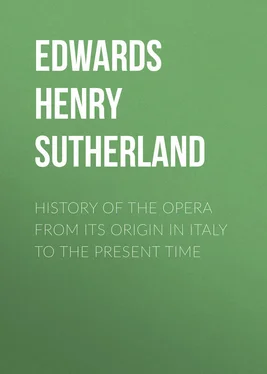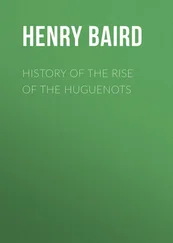Henry Edwards - History of the Opera from its Origin in Italy to the present Time
Здесь есть возможность читать онлайн «Henry Edwards - History of the Opera from its Origin in Italy to the present Time» — ознакомительный отрывок электронной книги совершенно бесплатно, а после прочтения отрывка купить полную версию. В некоторых случаях можно слушать аудио, скачать через торрент в формате fb2 и присутствует краткое содержание. Жанр: foreign_home, music_dancing, foreign_antique, foreign_prose, на английском языке. Описание произведения, (предисловие) а так же отзывы посетителей доступны на портале библиотеки ЛибКат.
- Название:History of the Opera from its Origin in Italy to the present Time
- Автор:
- Жанр:
- Год:неизвестен
- ISBN:нет данных
- Рейтинг книги:4 / 5. Голосов: 1
-
Избранное:Добавить в избранное
- Отзывы:
-
Ваша оценка:
- 80
- 1
- 2
- 3
- 4
- 5
History of the Opera from its Origin in Italy to the present Time: краткое содержание, описание и аннотация
Предлагаем к чтению аннотацию, описание, краткое содержание или предисловие (зависит от того, что написал сам автор книги «History of the Opera from its Origin in Italy to the present Time»). Если вы не нашли необходимую информацию о книге — напишите в комментариях, мы постараемся отыскать её.
History of the Opera from its Origin in Italy to the present Time — читать онлайн ознакомительный отрывок
Ниже представлен текст книги, разбитый по страницам. Система сохранения места последней прочитанной страницы, позволяет с удобством читать онлайн бесплатно книгу «History of the Opera from its Origin in Italy to the present Time», без необходимости каждый раз заново искать на чём Вы остановились. Поставьте закладку, и сможете в любой момент перейти на страницу, на которой закончили чтение.
Интервал:
Закладка:
The musical direction of our Royal Academy of Music was confided to Handel, who, besides composing for the theatre himself, engaged Buononcini and Ariosti to write for it. He also proceeded to Dresden, already celebrated throughout Europe for the excellence of its Italian Opera, and engaged Senesino, Berenstadt, Boschi, and Signora Durastanti.
Handel's first opera at the Royal Academy of Music was Radamisto , which was hailed on its production as its composer's masterpiece. "It seems," says Dr. Burney, "as if he was not insensible of its worth, as he dedicated a book of the words to the king, George I., subscribing himself his Majesty's 'most faithful subject,' which, as he was neither a Hanoverian by birth, nor a native of England, seems to imply his having been naturalised here by a bill in Parliament."
Buononcini, (who, compared with Handel, was a ninny, though others said that to him Handel was scarcely fit to hold a candle, &c.) produced his first opera also in 1720. It was received with much favour, and by the Buononcinists with enthusiasm.
The next opera was Muzio Scevola , composed by Handel, Buononcini, and Ariosti together. It is said that the task of joint production was imposed upon the three musicians by the masters of the Academy, by way of competitive examination, and with a view to test the abilities of each in a decisive manner. If there were any grounds for believing the story, it might be asked, who among the directors were thought, or thought themselves qualified to act as judges in so difficult and delicate a matter.
In the meanwhile the opera of the three composers did but little good to the theatre, which, in spite of its admirable company, was found a losing speculation, after a little more than a year, to the extent of £15,000. Thirty-five thousand pounds remained to be paid up, but the rest of the subscription money was not forthcoming, and the directors were unable to obtain it until after they had advertised in the newspapers that defaulters would be proceeded against "with the utmost rigour of the law."
A new mode of subscription was then devised, by which tickets were granted for the season of fifty performances on receipt of ten guineas down, and an engagement to pay five guineas more on the 1st of February, and a second five guineas on the 1st of May. Thus originated the operatic subscription list which has been continued with certain modifications, and with a few short intervals, up to the present day.
Buononcini's Griselda , which passes for his best opera, was produced in 1722, with Anastasia Robinson in the part of the heroine. Handel's Ottone and Flavio were brought out in 1723; his Giulio Cesare and Tamerlano in 1724; his Rodelinda in 1725; his Scipione and Alessandro in 1726; his Admeto and Ricardo in 1727; his Siroe and Tolomeo in 1728 – when the Royal Academy of Music, which had been carried on with varying success, and on the whole with considerable ill success, finally closed.
Buononcini's last opera, Astyanax , was produced in 1727, after which the Duchess of Marlborough, his constant patroness, gave the composer a pension of five hundred a year. A few years afterwards, however, he stole a madrigal, the invention of a Venetian named Lotti, and the theft having been discovered and clearly proved, Buononcini left the country in disgrace. Similar thefts are practised in the present day, but with discretion and with ingeniously worded title pages. Buononcini should have simply called his plagiarism a "Venetian Madrigal, dedicated to the Duchess of Marlborough by G. Buononcini." This unfortunate composer, whom Swift had certainly described in a prophetic spirit as "a ninny," left England in 1733, with an Italian Count whose title appears to have been about as authentic as Buononcini's madrigal, and who pretended to possess the art of making gold, but abstained from practising it otherwise than by swindling. Buononcini was for a time the dupe of this impostor. In the meanwhile he continued the exercise of his profession, at Paris, where we lose sight of him. In 1748, however, he went to Vienna, and by command of the Emperor composed the music for the festivities given in celebration of the peace of Aix-la-Chapelle. Thence he proceeded with Montecelli, the composer, to Venice, where the affair of the madrigal was probably by this time forgotten. At all events, no importance was attached to it, and Buononcini was engaged to write an opera for the Carnival. He was at this time nearly ninety years of age. The date of his death is not recorded, but Dr. Burney tells us that he is supposed to have lived till nearly a hundred.
Besides the annual subscriptions, to the Royal Academy of Music the whole of the original capital of £50,000 was spent in seven years. In spite, then, of the admirable works produced by Handel, the unrivalled company by which they were executed, and the immense sums of money lavished upon the entertainment generally, the Italian Opera in London proved in 1728 what it had proved twelve years before, a positive and unmistakable failure. This could scarcely have been owing, as has been surmised, to the violence of the disputes concerning the merits of Handel and Buononcini, the composers, or of Faustina and Cuzzoni, the singers, for the natural effect of such contests would have been to keep up an interest in the performances. Probably few at that time had any real love for Italian music. A certain number, no doubt, attended the Italian Opera for the sake of fashion, but the greater majority of the theatre-going public were quite indifferent to its charms. Dr. Arbuthnot, one of the few literary men of the day who seems to have really cared for music, writes as follows, in the London Journal , under the date of March 23rd, 1728: – "As there is nothing which surprises all true lovers of music more than the neglect into which the Italian operas are at present fallen, so I cannot but think it a very extraordinary instance of the fickle and inconstant temper of the English nation, a failing which they have always been endeavouring to cast upon their neighbours in France, but to which they themselves have just as good a title, as will appear to any one who will take the trouble to consult our historians." He points out that after adopting the Italian Opera with eagerness, we began, as soon as we had obtained it in perfection, to make it a pretext for disputes instead of enjoying it, and concludes that it was supported among us for a time, not from genuine taste, but simply from fashion. He observes that The Beggars' Opera , then just produced, was "a touchstone to try British taste on," and that it has "proved effectual in discovering our true inclinations, which, however artfully they may have been disguised for a while, will one time or another, start up and disclose themselves. Æsop's story of the cat, who, at the petition of her lover, was changed into a fine woman, is pretty well known, notwithstanding which alteration, we find that upon the appearance of a mouse, she could not resist the temptation of springing out of her husband's arms to pursue it, though it was on the very wedding night. Our English audience have been for some time returning to their cattish nature, of which some particular sounds from the gallery have given us sufficient warning. And since they have so openly declared themselves, I must only desire that they will not think they can put on the fine woman again just when they please, but content themselves with their skill in caterwauling. For my own part, I cannot think it would be any loss to real lovers of music, if all those false friends who have made pretensions to it only in compliance with the fashion, would separate themselves from them; provided our Italian Opera could be brought under such regulations as to go on without them. We might then be able to sit and enjoy an entertainment of this sort, free from those disturbances which are frequent in English theatres, without any regard, not only to performers, but even to the presence of Majesty itself. In short, my comfort is, that though so great a desertion may force us so to contract the expenses of our operas, as would put an end to our having them in as great perfection as at present, yet we shall be able at least to hear them without interruption."
Читать дальшеИнтервал:
Закладка:
Похожие книги на «History of the Opera from its Origin in Italy to the present Time»
Представляем Вашему вниманию похожие книги на «History of the Opera from its Origin in Italy to the present Time» списком для выбора. Мы отобрали схожую по названию и смыслу литературу в надежде предоставить читателям больше вариантов отыскать новые, интересные, ещё непрочитанные произведения.
Обсуждение, отзывы о книге «History of the Opera from its Origin in Italy to the present Time» и просто собственные мнения читателей. Оставьте ваши комментарии, напишите, что Вы думаете о произведении, его смысле или главных героях. Укажите что конкретно понравилось, а что нет, и почему Вы так считаете.












